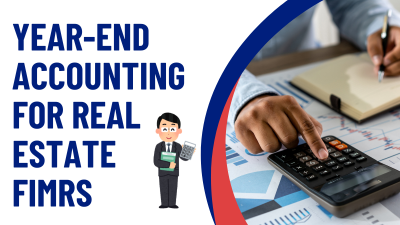
Year-End Accounting of Real Estate Companies: Specific Challenges and Solutions
- November 28, 2024
- OHI

Year-end accounting is one of the most important processes real estate companies undertake to report accurately, ensure compliance, enhance strategic decision-making, and support investor confidence. The unique structure of property management, development, and investment in the industry brings along unique challenges to be addressed with adequate solutions.
We will look at some of the unique challenges real estate companies face with year-end accounting and outline effective strategies to overcome them.

Real estate companies often have multiple revenue streams such as rental income, property sales, development projects, and commissions. Managing diverse income sources while staying with revenue recognition principles can cloud the picture while ending the year.
For example: revenue from long-term leases must be recognized over the lease period, while revenue from property sales is recognized upon transaction completion. This requires meticulous tracking and reconciliation.
There are depreciations on real estate assets, which one needs to calculate and record with accuracy. Different asset classes, such as buildings, land improvements, and equipment, have different depreciation schedules and methods of calculation, say, straight line or declining balance. If the wrong method is applied, this could become misstated financial statements.
Real estate valuation faces day-to-day fluctuations due to market dynamics. Companies need to establish the fair market value of their properties and adjust their financial statements. This can often involve appraisals and market research.
Real estate is by itself a very complex industry with tax considerations. It will include property taxes, capital gains taxes, and depreciation recapture. These complications require an extensive understanding of the tax laws and accurate financial records to manage these tax obligations.
Many companies own and manage real estate through multiple legal entities, including special purpose vehicles or joint ventures. The data for year-end reporting about such entities are rather complex, especially considering intercompany transactions and eliminations.
Real estate projects involve various expenses, including maintenance, utilities, legal fees, and construction costs. Tracking and categorizing these expenses for financial reporting is essential but challenging due to their volume and complexity.
There are lease accounting standards such as ASC 842 or IFRS 16, and real estate companies need to adhere to them and their accounting differs between operating and finance leases. This includes identification of components, liabilities calculation, and improvements in financial systems to meet required compliance.

These kinds of tools tend to help handle the entire year-end process. It will also handle automated processes, such as revenue recognition, depreciation calculation, and financial consolidation. There are examples like Yardi, MRI Software, and Buildium.
It also gives real-time insights for tracking financial performances and identification of discrepancies early.
Keeping accurate records throughout the year reduces the effort required to close the year-end accounts. Introduce a standardized, centralized document management procedure for contracts, invoices, as well as financial statements. Reconcile accounts regularly and update all of your financial records.
For proper property valuation, engage professional appraisers or valuation experts. Their professional judgement ensures adherence to fair market value principles and a reliable base for financial reporting.
Relief from the overcomplex tax terrain: Partnering with tax professionals or outsourcing to specialized firms can ensure compliance with tax laws while optimizing deductions and credits.
Outsourcing also frees internal teams to concentrate on strategic tasks, such as financial analysis and forecasting.
Standardization of accounting processes would be very helpful for companies with a multi-entity structure. Accounting software shall be applied likewise and have uniform policies for expense tracking, revenue recognition, and intercompany transactions.
Regular orientation of the members so that they can have understanding of all these standards.
To remain in line with lease accounting standards, build a framework or process for which leases to identify and where to place them. Use lease management software to automatically calculate lease liabilities and generate required disclosures.
Early adoption avoids last-minute compliance problems.
Internal audits can identify discrepancies, fraud, or inefficiencies throughout the year. In a periodical review of financial records, the year-end process is smoother and accurate.
Automation tools can eliminate manual errors and increase efficiency in areas such as data entry, reconciliations, and financial reporting. For instance, RPA can streamline repetitive tasks, allowing staff to focus on analysis and decision-making.

Plan your year-end accounting in advance. Do it by making a timeline for the important milestones that include reconciliation of accounts, finalization of financial statements, and audit.
Inform all stakeholders regarding year-end accounting activities, especially when they affect operations or require additional data. Open communication is an excellent way to collaborate and avoid delays.
Examine all of the financial statements, including the balance sheet, income statement, and cash flow statement, in significant detail. Check that all the numbers balance with the supporting documentation and note any discrepancies.
Many year-end account balances rely on assumptions, judgments made at a point in time. Document these assumptions to enhance transparency and audit readiness.
Make use of end accounts to process improvements for the next year. Identify bottlenecks and implement changes accordingly. There should be a target for better financial management.

Real estate companies have complex year-end accounting, but the proper strategies and tools will help smoothen out issues. Addressing challenges in revenue recognition, property valuation, and consolidation of multi-entities will enable a real estate company to ascertain accurate financial reporting and compliance.
The key lies in preparation, automation, and leveraging professional expertise where needed. These efforts not only simplify the year-end process but also provide valuable insights to drive strategic decisions and foster growth.
Real estate companies that implement these solutions will be better set up for success in the competitive real estate landscape.
Contact us for a customized NO OBLIGATION proposal for outsourcing your accounting activities.







